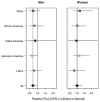Association of vegetable, fruit, and grain intakes with colorectal cancer: the Multiethnic Cohort Study
- PMID: 18779290
- PMCID: PMC4482464
- DOI: 10.1093/ajcn/88.3.730
Association of vegetable, fruit, and grain intakes with colorectal cancer: the Multiethnic Cohort Study
Abstract
Background: It is uncertain whether or not vegetables, fruit, or grains protect against colorectal cancer.
Objective: In a large prospective study, we investigated the association of vegetable, fruit, and grain intakes with colorectal cancer risk.
Design: Between 1993 and 1996, 85 903 men and 105 108 women completed a quantitative food-frequency questionnaire that included approximately 180 foods and beverages in the Multiethnic Cohort Study. A diagnosis of colorectal cancer was made in 1138 men and 972 women after an average follow-up of 7.3 y. Cox proportional hazards models were used to calculate multivariate-adjusted relative risks and 95% CIs for colorectal cancer.
Results: In men, multivariate adjustment for energy intake, dietary, and nondietary variables resulted in relative risks in the highest quintile group of 0.74 (95% CI: 0.59, 0.93; P for trend = 0.02) for vegetables and fruit combined, 0.80 (95% CI: 0.64, 0.99; P for trend = 0.09) for fruit alone, and 0.85 (95% CI: 0.69, 1.05; P for trend = 0.05) for vegetables alone. When colon and rectal cases were separated among men, the inverse associations were stronger for colon than for rectal cancer. In women, none of the associations with vegetables, fruit, or vegetables and fruit combined were significant. Grain intake was not associated with colorectal cancer for either men or women.
Conclusion: The intake of vegetables and fruit was inversely related to colorectal cancer risk among men but not among women. The association appears stronger for colon than for rectal cancer.
Figures

References
-
- Steinmetz KA, Potter JD. Vegetables, fruit, and cancer. II. Mechanisms Cancer Causes Control. 1991;2:427–42. - PubMed
-
- Park Y, Subar AF, Kipnis V, et al. Fruit and vegetable intakes and risk of colorectal cancer in the NIH-AARP Diet and Health Study. Am J Epidemiol. 2007;166:166–70. - PubMed
-
- McCullough ML, Robertson AS, Chao A, et al. A prospective study of whole grains, fruits, vegetables and colon cancer risk. Cancer Causes Control. 2003;14:959–70. - PubMed
-
- Voorrips LE, Goldbohm RA, van Poppel G, Sturmans F, Hermus RJJ, van den Brandt PA. Vegetable and fruit consumption and risks of colon and rectal cancer in a prospective cohort study. Am J Epidemiol. 2000;152:1081–92. - PubMed
-
- Michels KB, Giovannucci E, Joshipura KJ, et al. Prospective study of fruit and vegetable consumption and incidence of colon and rectal cancers. J Natl Cancer Inst. 2000;92:1740–52. - PubMed
Publication types
MeSH terms
Grants and funding
LinkOut - more resources
Full Text Sources
Medical

